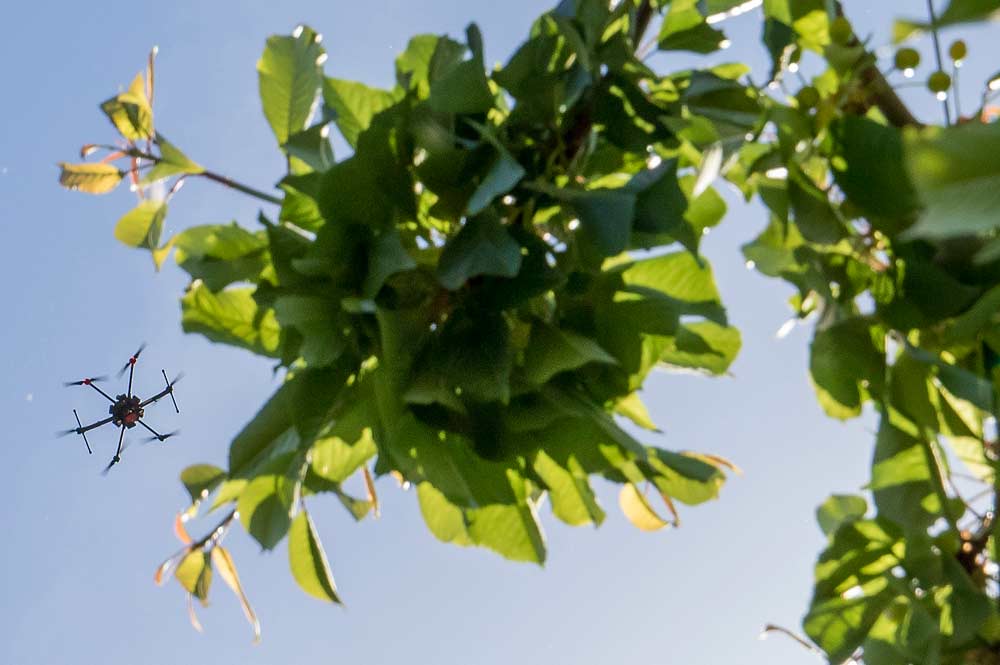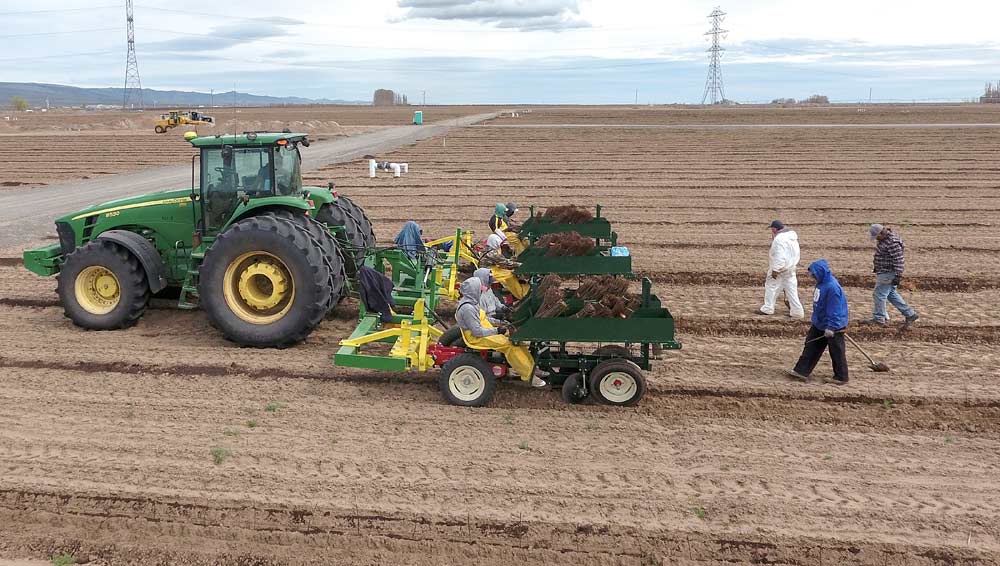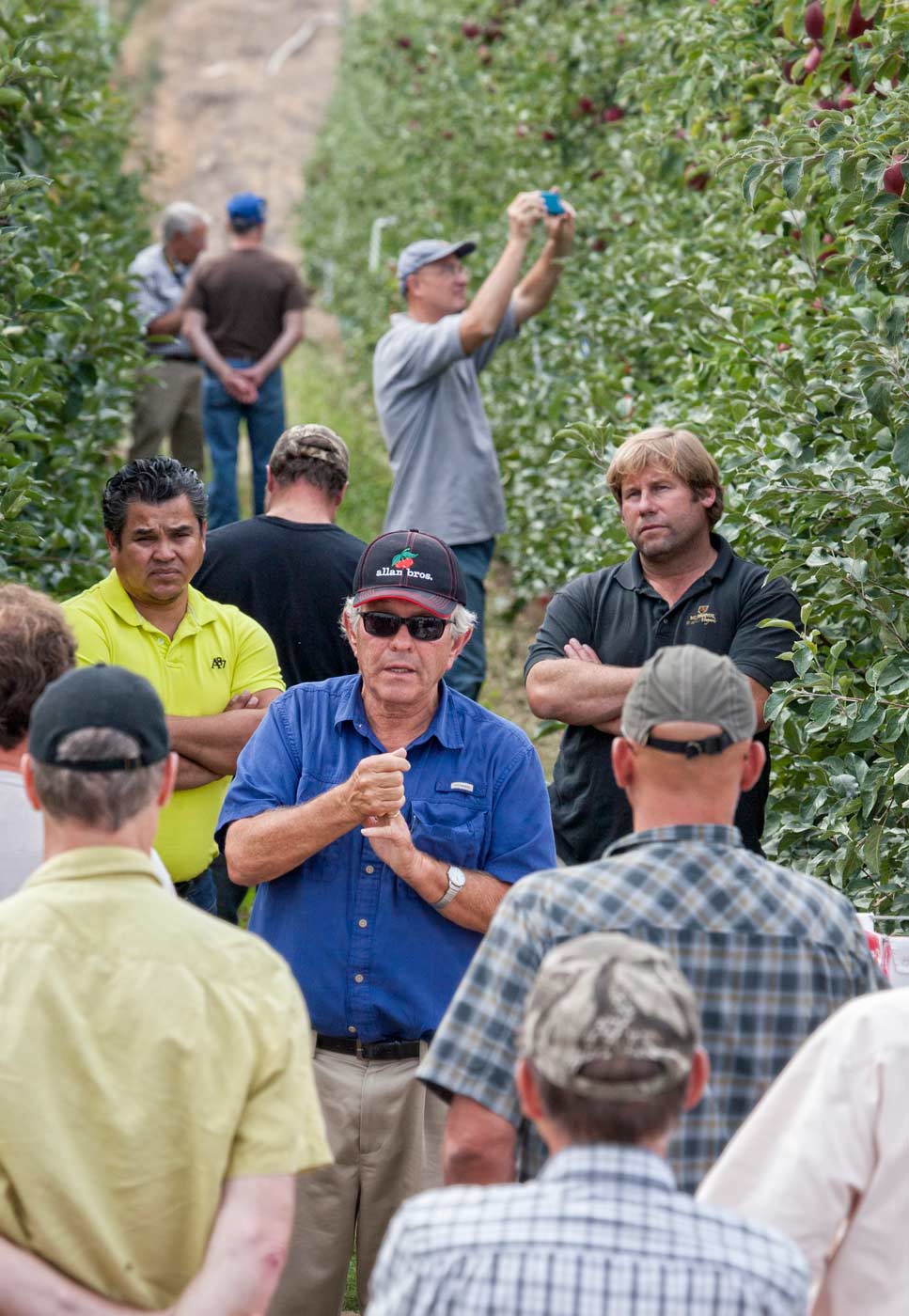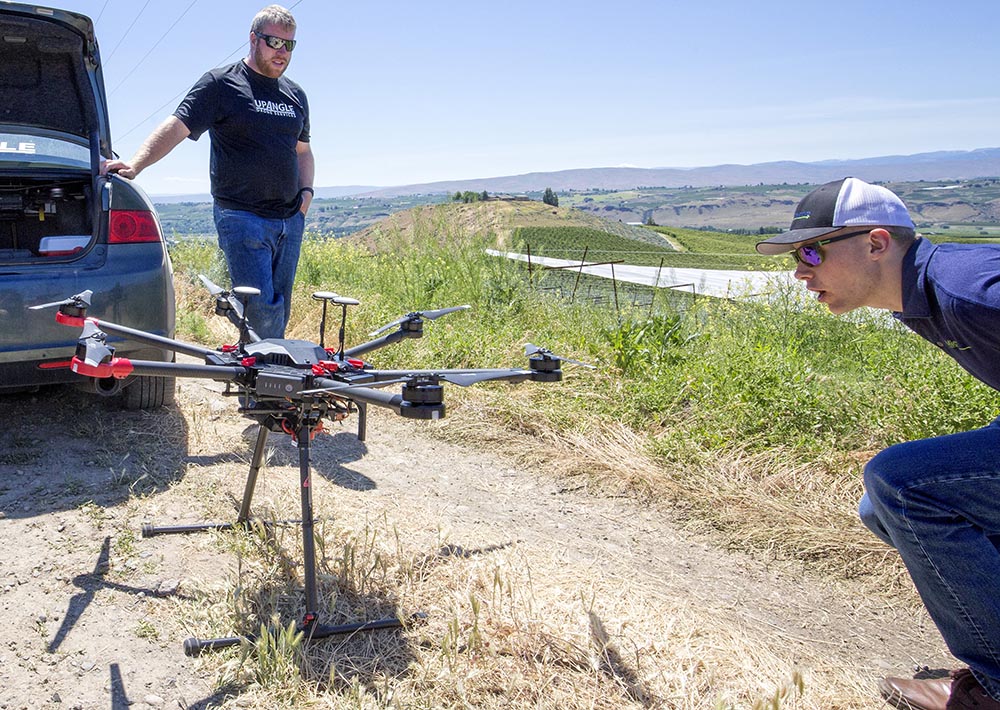
A drone soars over the tree canopy at an Allan Bros. orchard in Selah, Washington. The longtime fruit company experiments with new technologies, including the use of aerial imagery to monitor orchard health. (TJ Mullinax/Good Fruit Grower)
More recently because of their experimental work with the developer of the front-running mechanical harvester, Allan Bros. is earning the reputation as one of the more technologically savvy and innovative companies in the U.S. tree fruit industry.
The Naches, Washington, fruit company has interest in many projects but was one of the first to collaborate with Abundant Robotics, the California company developing a robotic vacuum apple harvester.
“Allan Bros. has encouraged our work on automated harvesting from the very beginning, providing feedback, advice and orchard space to test our ideas and our systems,” said Dan Steere, CEO of Abundant.
Besides its work with Abundant, Allan Bros. has its fingerprints on a variety of projects with different companies and researchers:
—Artificial spur extinction with New Zealand researchers. The method sets optimal crop load based on branch size and is considered experimental because it involves measuring every single branch using a size wheel on a commercial scale. It involves pruning in early spring for the ideal fruit bud count based on branch caliper, followed by pruning at first pink bloom and thinning green fruit to fine tune crop load.
It’s also an attempt to get away from chemical thinners.

An Allan Bros. three-row planter works one of the company’s Mattawa, Washington, ranches in March. The custom-built machine helped crews plant 143 acres of apple trees in a high-density planting in under five days. (Courtesy Larry Schmits)
—An automated three-row planter the company uses commercially. The planter, which the company purchased but modified with hydraulics and a toolbar, can plant up to 72,000 trees per day. The machine automatically ensures even spacing between trees.
—Overhead imagery with MicaSense, a Seattle sensor and data company. Yes, that’s drones, if you’re wondering. The company is searching for ways to identify stress in orchards from overhead imagery and eventually equip tractor operators and other machinery with data from the drones to let them turn on and off, say, fertilizer tree by tree.
—In collaboration with Washington State University, trials using gum acacia (gum arabic) and an air knife inside cherry packing facilities. The company has been working for three years on using forced air — the air knife — to dry cherries after they’ve gone through water on the packing line. Gum arabic helps protect cherries from absorbing too much water.
—A new apple packing warehouse and line with sorting technology that will allow for predictive analysis, said Miles Kohl, Allan Bros. CEO. (More to be revealed when it handles its first crop next fall.) The list goes on.
The company employs its own research and development staff of four — two dedicated to fruit physiology in both the orchard and warehouses, two dedicated to scouting and developing new varieties, Kohl said.
Kohl attributed the innovative culture to the Allan family’s long tradition of curiosity.
“It really started with the Allan family originally,” Kohl said. “That was really their way. That was bred in them, to find a way to do something better.”
Private investment

Dave Allan talks about WA 38 during a preharvest preview of the variety in Prosser, Washington, in 2014. Allan Bros. helped pioneer commercial test plantings of WSU’s newest variety, now known by the brand name Cosmic Crisp.(TJ Mullinax/Good Fruit Grower)
Allan Bros. is hardly the only innovative fruit company. Stemilt Growers of Wenatchee has its own research and development team. Many others have similar staff members, even if they go by a different title. Those that don’t soon will, Kohl said.
Company-backed trials and experiments include rigorous protocols led by skilled technicians and being viewed with greater respect than in the past, said Karen Lewis, Washington State University Extension specialist.
Companies like Allan Bros. invest in experiments to find answers more quickly than public research can provide, Lewis said.
“Peer review is a long process in the academic world,” she said. Companies “have their own peer-review system and it is quicker. While testing a practice or product, they can also assess cost to implement, ROI (return on investment), logistics to implement, short-, mid- and long-term impacts specific to their operation. They get a real sense on whether they can implement a practice or technology. There are limits to what can actually get executed correctly and on time.”
Suzanne Niemann, a horticultural research specialist for Allan Bros., said her company’s involvement is no accident. The company considers research a priority and is willing to invest.
“We’re going to take the time to learn what we want to know and take the risk to do that,” she said. “It’s going to cost something to find out this information, and we’re ready to take that leap.”
Much of the experimental culture stems from the simple curiosity of Dave Allan, a third-generation family member with the company and the former orchard manager. A member of the Washington Tree Fruit Research Commission since 1978, Allan started working with Curt Salisbury, Abundant’s chief technology officer, in 2012.
“Kurt and I went running around all over the place sucking apples with this primitive vacuum, monster, primitive vacuum thing,” Allan said.
The commission contributed $550,000 toward the mechanization project.
This year, Abundant will conduct trials on 14 orchards, including some Allan Bros. orchards near Prosser, Washington, all on blocks either planted or trained to be “robot ready” — two-dimensional with easy to see and reach fruit.
Allan also has ideas for how to automate branch tying, but that’s for later, he said. He is semiretired, as he calls it, and spends his extra time tinkering with what could be.
“I have the free time to do this kind of stuff, and I’m totally enjoying it. I’m just having a lot of fun.” •

John Sulik of MicaSense inspects one his company’s sensors mounted onto a drone owned by Bryan Monarch of UpAngle Drone Services in preparation for a flight over Allan Bros. orchards. (TJ Mullinax/Good Fruit Grower)
– by Ross Courtney






Leave A Comment